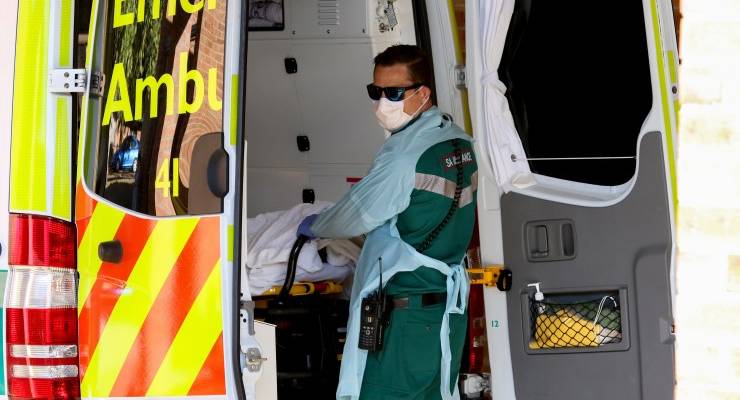
No one knows what will happen at hospitals in New South Wales and Victoria in the lead-up to Christmas and beyond after we open up. But with modelling suggesting hospitals stand a good chance of being overwhelmed with mostly unvaccinated COVID-19 patients, Australians have cause to be concerned.
Italy’s hospitals were catastrophically overwhelmed early in the pandemic, and the entire US state of Idaho has begun rationing treatment according to “crisis standards of care” after its hospitals were overwhelmed.
The usual way Australian hospitals decide who gets treated is either randomly (first come, first served) or when resources are too stretched for that, prioritising patients based on acuity or the immediately life-threatening nature of the patient’s condition.
Note the word “prioritising”. While it may not always seem this way when you’re in a public hospital waiting room at 2am with a sick toddler, the triage system doesn’t decide who will and won’t receive care, or the quality of care. It just lines you up in order of urgency and seriousness to eventually receive what in our health system is a gold standard of care.
The alternative is crisis standards of care. These can include:
- Receiving care in a hospital room that was previously used as a classroom, or in a hallway or tent
- Deferring elective surgery requiring postoperative ICU or high-dependency unit care
- Less qualified and/or fewer nurses and doctors taking care of more patients
- Waiting many hours for care or being transferred to a distant hospital to receive it
- Giving a staffed ICU bed or a ventilator to someone else deemed more likely to survive. In some Australian hospitals, this could be coupled with other exclusion criteria, such as preferencing those who are not obese or alcohol- dependent.
In NSW, we’ve seen the pressure on hospitals lead to queues of ambulances waiting to discharge patients. Ambulance response times are down in Victoria, and both states have delayed misleadingly named “elective” surgeries — which include heart and cancer operations — leaving Australians to witness their loved one’s quality of life or odds of survival drain away as the intensive care they need is prioritised to COVID patients.
At the start of the pandemic, it might have made sense. COVID patients can be acutely ill. None had any way of not catching the virus or becoming seriously ill, and many of us assumed deferring critical care to prioritise them was temporary.
But by the time Australia opens up, perhaps in December, this will no longer be the case. The pandemic will be almost two years old, and not only do we have a free, safe and effective vaccine, but governments should have ensured that every Australian who wants to be inoculated gets the information and outreach they need to readily access the vaccine recommended for their age and health situation.
As we’ve seen in Israel, the US and the UK, when countries open up, cases surge. For the unvaccinated, hospital admissions do too. The more unvaccinated people in a society, the more likely hospitals will be overwhelmed. This leads to the crisis standards of care that can leave vaccinated people unlucky enough to need hospitalisation for COVID or some other serious illness without an expertly staffed ICU bed.
Is this even remotely fair? If what we mean by “unvaccinated” are not those with a legitimate medical exemption but what I will call the “voluntarily unvaccinated”, I think not.
In fact, once Australians are confident that everyone who wants a vaccination or requires an exemption has been provided for, what we are left with resembles the mob-like assemblages of neo-Nazis, right-wing extremists and agitated union members demanding their rights while shrugging off responsibilities as they hurled bottles and plastic crates and kicked in the glass entrance of the CFMMEU headquarters in a violent protest in Melbourne on Monday, and then another vicious protest in Melbourne on Tuesday.
Angry, ignorant and entitled or — as former AWU national secretary and former Labor opposition leader Bill Shorten memorably described them — “hard-right man-baby Nazis”. These are the people who are or could displace your obese aunt, your best friend with cancer, or you in an acute-care queue that could be coming to a Melbourne or Sydney hospital near you when, as is inevitable, such voluntarily unvaccinated catch COVID, get seriously ill and swamp hospitals.
Unless we say no, because that way of distributing scarce resources is unjust and unfair.
No one who has done the right thing by themselves, their family, health workers and the community by getting vaccinated should have their care delayed or be turned away from receiving timely, standard hospital care because the beds are full and nurses are too busy caring for those more than happy to bet our lives that COVID wasn’t real.
There has to be another way.
Do you agree with Cannold? Let us know your thoughts by writing to letters@crikey.com.au. Please include your full name if you would like to be considered for publication in Crikey’s Your Say column. We reserve the right to edit for length and clarity.








Crikey is committed to hosting lively discussions. Help us keep the conversation useful, interesting and welcoming. We aim to publish comments quickly in the interest of promoting robust conversation, but we’re a small team and we deploy filters to protect against legal risk. Occasionally your comment may be held up while we review, but we’re working as fast as we can to keep the conversation rolling.
The Crikey comment section is members-only content. Please subscribe to leave a comment.
The Crikey comment section is members-only content. Please login to leave a comment.